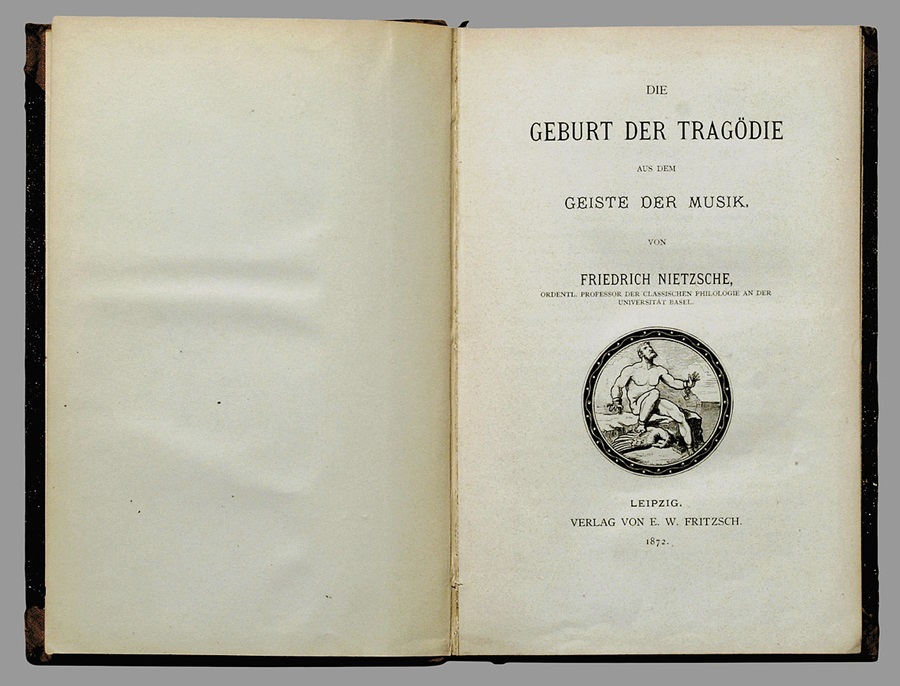- HumanitiesPhilosophy
- 30 de April de 2024
- No Comment
- 7 minutes read
The Philology of the Future and the Academy of the Past: On the Publication of Friedrich Nietzsche’s The Birth of Tragedy

The Philology of the Future and the Academy of the Past: On the Publication of Friedrich Nietzsche’s The Birth of Tragedy
The Birth of Tragedy was and continues to be a controversial text, and it was not without cost to Nietzsche’s biography

It could be argued that Friedrich Nietzsche stands as a thinker whose influence has never ceased to be felt in subsequent philosophy. His intellectual figure persistently inspires essays, novels, and films. However, a little-known biographical scene was his tense relationship with one of the most important classical philologists of his era, Ulrich von Wilamowitz. This relationship bears witness between the vitalism of ideas and the immobility of academia, echoes of which resonate to this day.
In 1872, Nietzsche’s eagerly anticipated first work, The Birth of Tragedy from the Spirit of Music, was published. At the tender age of twenty-four and without formal qualification, Nietzsche already held a professorship at the University of Basel. He had written this work with a philologist audience in mind, his new professional sphere. It was a surprise for the philosopher when he found himself enveloped in a cold, impenetrable silence: weeks passed without a single review being published — not even the anticipated defence article authored by Ritschl, the mentor who had facilitated his university appointment. A punishing silence had been imposed on The Birth of Tragedy, catalogued by academia as mere “Wagnerian ideology”. Almost half a year later, Ulrich von Wilamowitz, a young university professor destined to become one of the most important classical philologists of his time, would publish a pamphlet against the new publication titled “Philology of the Future!”.
Wilamowitz, a product of the Polish aristocracy, had known Nietzsche personally from their student years at Pforta. He had initially set out to write a formal review of the work, but his confusion and scorn for its content had escalated, infusing his writing with a markedly acidic prose. His discourse displayed no interest in Nietzschean metaphysics: the philologist’s fury was directed entirely towards defending the methodologies of academia, against the careless use of the ancient world, and in support of the methodological principles of classical philology. This was the central point of Wilamowitz’s manifesto and what made it so daring: to point out the deficiencies and methodically tear apart each page of The Birth of Tragedy, a work with hardly any footnotes or references; its literary style almost evaded all possible philological criticism.
Wilamowitz denounced Nietzsche’s tone, whom he labels as a prophet, an apostle of a new religion. He accused Nietzsche of ignorance and deliberate deception for his anti-historicist method, which consisted in taking certain ancient elements and contrasting them, without any semblance of modesty, with the present. It’s worth noting that the pages of the philologist represent in themselves a clear plea in favour of Alexandrian academic practice: each page is full of footnotes, allusions to classical texts and Greek proverbs, while gradually destroying, with references and evidence, every documentation or bibliography defect of his colleague’s work. He accuses Nietzsche, for example, of completely ignoring the Homeric question and speaking of Homer as a univocal author; of discussing Greek music without any evidence of how it might sound; of overlooking the role of the tragic heart and even of misleading the reader about the potential relationship between Socrates and Euripides. However, it is also true that Wilamowitz employs rhetorical topics and partial quotes to intentionally discredit Nietzsche and the new path that his treatise opened in the interpretation of classical culture — and, by extension, of the contemporary one. He never wanted to concede that the writing, despite its lack of philological rigor, could have some interest for the interpretation of Wagnerian musical drama. Even in his memoirs, he continued to defend the key points of his pamphlet.
As understood by contemporary historiography, this was an exemplary dispute in the midst of a growing rivalry between philological schools of the time, but also between the emerging figure of the twentieth-century intellectual and the power that university departments had hitherto held. In his writings, Wilamowitz also targeted a young academic, Erwin Rhode, a friend of Nietzsche, who would eventually emerge as a reformer of classical literary studies. However, the university status that the classicist defended would once again be preserved: Nietzsche was urged by the authorities to resign his chair. Although he initially resisted, over the years his classes would gradually empty, and the echoes of the conflict would perpetually reverberate through the corridors.
This is not about making history-fiction and speculating whether Nietzsche’s academic life would have been smoother without the dispute with Wilamowitz. It is probable that the progression of his illness and the misunderstanding of his colleagues would have inevitably propelled him towards a life of independent intellectualism. The Birth of Tragedy was, and continues to be, a controversial text, and it came at a significant cost to Nietzsche’s biography. Even today, we could find other examples in our universities —so different from those the philosopher knew, and yet so similar— of disputes and difficult decisions where the author risks more than just a mention in the curriculum. An episode like this serves as a reminder that philosophical and cultural transformations have invariably incited conflict, and that conflict is often the most reliable indicator of truth.
Source: educational EVIDENCE
Rights: Creative Commons


